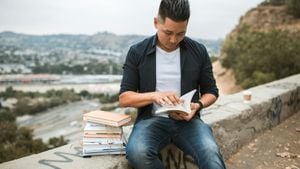Hong Kong's High Court sent shockwaves through the pro-democracy community this week as it handed down prison sentences to 45 activists, reaffirming the chilling consequences of Beijing's imposition of national security laws. The sentences ranged up to ten years, marking this as one of the most significant crackdowns on dissent since the 2019 anti-government protests.
The trial was rooted in events from July 2020, where these activists organized what they termed an unofficial primary election. This election aimed to select the best candidates to challenge the pro-Beijing establishment during the upcoming Legislative Council elections. The court's decision highlighted the tenuous state of civil liberties, and many see this as part of Beijing's broader strategy to suppress opposition and silence dissent.
Among those sentenced, Benny Tai, a legal scholar widely recognized as one of the primary architects of the primary election concept, received the longest sentence of ten years. His colleague, the internationally known activist Joshua Wong, was sentenced to four years and two months. Other noted figures, such as former journalist Gwyneth Ho, received severe penalties as well. The core of the prosecution's argument held the activists accountable for attempting to destabilize the government through legislative maneuvers, which they claimed were tantamount to rebellion against the state.
The campaign to undermine the administration by potentially paralyzing its budget process was described by prosecutors as nothing less than subversion. They contended the activists intended to leverage legislative control to force the resignation of the city's leaders, thereby disrupting the government effectively. The judges cited the significant resources and extensive planning invested by the activists as evidence of their serious intent.
Yet, the verdicts sparked fierce criticism from various quarters, with prominent human rights organizations like Human Rights Watch calling the trial politically motivated. Maya Wang, the associate China director at HRW, remarked how running for office now triggers harsh legal repercussions, fundamentally undermining the principles of democracy.
Swift condemnation also flooded in from government officials around the world. Australia’s Foreign Minister Penny Wong characterized the sentences as unjust, stating her country had formally lodged complaints about the treatment of Gordon Ng, another activist sentenced to over seven years. The US consulate echoed these sentiments, labeling the trials as politically charged and branded illegal under the guise of national security laws.
The lengthy trial process—spanning over 118 days and overseen by judges appointed directly by Beijing—broke many conventions of Hong Kong's judicial system, leading critics to question the integrity of the legal proceedings. Observers noted the absence of standard legal protections, like trial by jury and the presumption of innocence, as hallmarks of the proceedings' unfair nature.
Many of the fatigued defendants saw their efforts met with unsparing judicial rebukes. The judges remarked on the diligence and planning exhibited to organize the primary, which countered the defense’s claims of the event being merely theoretical or academic. The court decreed these actions as having the potential to breach the Basic Law, Hong Kong’s constitutional framework inherited from Britain.
During the sentencing, emotional scenes unfolded outside the court as around 200 supporters braved inclement weather to express solidarity with the activists. Among them was ‘Grandpa Wong,’ whose advanced age intensified the sense of urgency and despair shared by many over the prolonged incarceration of their loved ones. Wei Siu-lik, expressing concern for her friend Clarisse Yeung, who received six years and nine months, stated, “I wanted them to know we’re still here for them.”
While some activists took the path of remorse, submitting letters asking for leniency, others displayed defiance throughout the proceedings. Even as their fates were being determined, they asserted their belief in the lawfulness of their campaign efforts, framing them as legitimate expressions of political aspirations. Their determination starkly contrasted against the repressive backdrop established by the state.
This event has become emblematic of the broader transformation within Hong Kong since the onset of the protests, portraying the city as increasingly aligned with mainland China's political ideologies. Critics argue the very freedoms promised at the time of the handover from British to Chinese rule are crumbling. Beijing's pledge to retain Hong Kong’s civil liberties for 50 years post-handover is widely perceived as tenuous at best.
Political analysts suggest these sentences are not merely punitive but serve as stark warnings to others contemplating similar actions against the established order. They see the advent of national security laws as not only aiming to restore order post-2019 protests but also as mechanisms to obliterate civic engagement.
Internationally, the backlash is palpable. Lawmakers and human rights advocates have stepped up calls for the release of the accused and decried the continuing trend of eroding freedoms. The sentences of the Hong Kong 47 have become rallying cries for pro-democracy movements globally, as observers anticipate stronger measures by foreign governments advocating for accountability on human rights violations in Hong Kong.
The broader consequences of this trial and the pathway it uncovers for future activism remain uncertain. With Hong Kong caught between its pro-democracy aspirations and the iron grip of authoritarian governance, many fear it may take years for dissenting voices and aspirations for liberty to be heard again.



